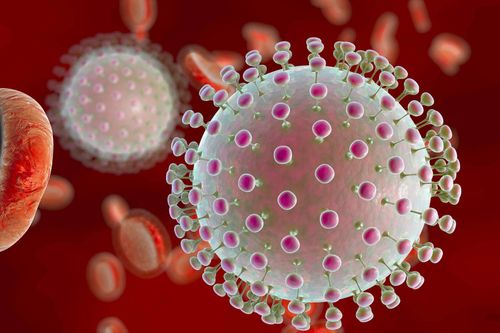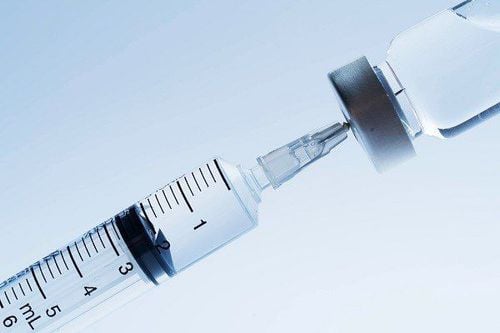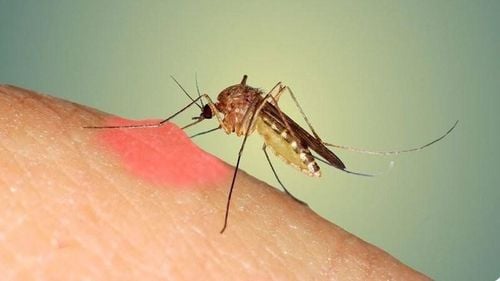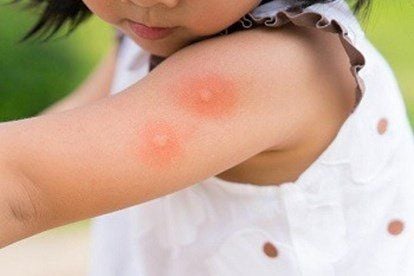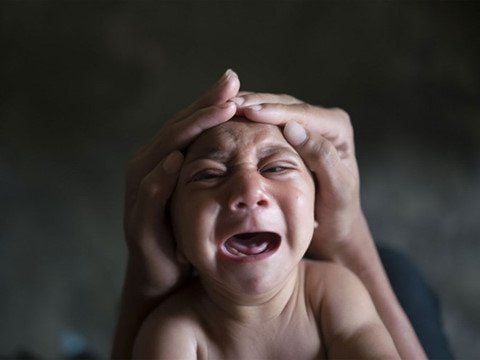This is an automatically translated article.
Almost everyone has been bitten by mosquitoes and insects. Normally, mosquito and insect bites will make you itchy and uncomfortable but will disappear over time and are not dangerous. But some mosquito bites can transmit viruses and cause serious illnesses.
1. Risk of infection from mosquito bites, insect bites
According to statistics from the US Centers for Disease Control and Prevention (CDC), every year more than 1.5 million people around the world die and hundreds of millions of people get sick from mosquito bites.
Each disease is transmitted by a different type of mosquito, but the mechanism is the same: Mosquitoes will suck blood from sick people and carry pathogens, then they bite healthy people and transmit pathogens to them. The pathogen then grows in the person's body and causes disease.
Mosquito-borne diseases can cause epidemics in the community. People infected with mosquito-borne diseases may die, leave sequelae or have reduced working capacity.
When bitten, the mosquito will release a substance that causes an allergic reaction, making the skin where the mosquito bites red, itchy and swollen. Only female mosquitoes bite humans and animals. Temperature, light, body odor and sweat are some of the factors that make you a target for mosquitoes.
Some people may be bitten by mosquitoes in large swarms like a beehive or develop large blisters. If mosquito bites make you uncomfortable, home remedies don't work, see your doctor for advice, treatment to reduce itching and swelling.
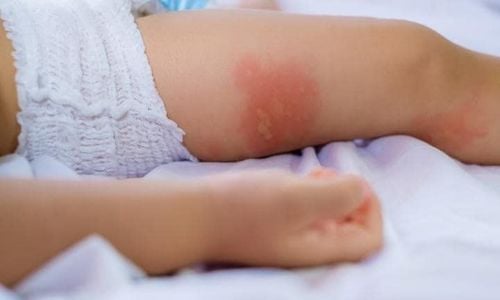
Một số vết muỗi đốt có thể lây truyền virus và gây ra các bệnh nghiêm trọng
Some diseases transmitted by mosquito bites:
LaCrosse encephalitis commonly occurs in the Midwest, Mid-Atlantic and Southeast countries; Encephalitis St. Louis occurs throughout the United States, especially the states of Florida and the Gulf of Mexico; Eastern Equine encephalitis, which is common in the Atlantic, Caribbean; Gulf Coast and Great Lakes; Central and South America; Japanese encephalitis commonly occurs in Asia and the Western Pacific; Zika virus disease: This disease was first recognized in Africa in the 1940s, it has since spread to South and Central America, the Caribbean, Mexico, Southeast Asia and the Pacific Islands; Chikungunya Virus Disease: This disease mainly occurs in the Caribbean and South America, chikungunya has spread in the United States; Dengue fever: This is a fairly common disease in our country, especially in the rainy season, there are times when dengue fever becomes endemic in many localities; Yellow fever disease; Malaria: This can be considered the oldest mosquito-borne disease we have ever known. Although known for a long time, the disease still causes more than 400,000 deaths worldwide each year. Countries located near the equator in Africa and tropical islands in the Pacific, such as Papua New Guinea, have the most malaria cases. For those unlucky enough to have Skeeter's syndrome, an ordinary mosquito bite can also become more serious. Skeeter syndrome was first defined in 1999 as a "local inflammatory response caused by mosquitoes with fever".
According to experts, skeeter syndrome is an allergic reaction to proteins in mosquito saliva. Most people have some kind of reaction like a small, red bump to a mosquito bite, but for some people the reaction is really extreme. People with this syndrome tend to get worse within hours, even minutes, of the bites.
Skeeter syndrome is characterized by symptoms of inflammation such as swelling, heat, redness, accompanied by itching or pain from a mosquito bite. In some cases these reactions are very serious, such as: The face and eyes may swell and the whole limbs may become red and swollen. In the most severe cases, mosquito bites can cause bruising and blistering. Some people with this syndrome may also have a fever or vomiting or have trouble breathing.
People with skeeter syndrome tend to be bitten by mosquitoes more than others. These people are at a higher risk of developing infections from mosquito bites because they are more likely to scratch their bites and have larger wounds.
So if you develop a fever after a mosquito bite or if the mosquito bite seems to get bigger or more inflamed and doesn't get better after a few days, see your doctor to rule out an infection.
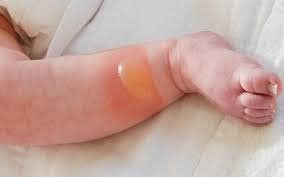
Nếu mắc hội chứng Skeeter thì vết muỗi đốt thông thường cũng có thể trở nên nghiêm trọng hơn
2. Do you need to use mosquito repellent?
Normally, after being bitten by a mosquito, the skin will be red, about 1-3 mm in size, then change to a dark color, fade and return to normal skin after a few days without using any medicine.
You may see mosquito bites in babies that leave long lasting bruises but you don't need to worry because these bruises will fade as the baby grows older. In principle, you shouldn't put any medication on a baby on a regular basis, even though it's advertised as good.
Let young skin develop a natural, not affected by chemicals. In addition, when you apply the drug to the mosquito bite of an infant, there may be unforeseen dangers such as irritation, allergies or skin damage. Newborns can splash the medicine in their eyes, nose, or mouth, causing eye and nose damage or poisoning by accidentally swallowing substances applied to the skin.
If you know you have skeeter syndrome, bring a spray bottle or wear clothing that covers your skin when going to areas with lots of mosquitoes. You can use an oral antihistamine such as Benadryl to relieve itching and swelling. An over-the-counter hydrocortisone cream can provide pain relief when applied directly to a mosquito bite.
If the bite is swollen, red, hot, you can apply cold to help reduce pain. After using the above methods without reducing itching and swelling, it is best to see a doctor to get advice from a specialist.
Please dial HOTLINE for more information or register for an appointment HERE. Download MyVinmec app to make appointments faster and to manage your bookings easily.





